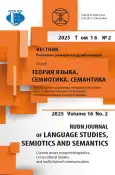Meaning as a Mechanism for Senses Transformation and Discourse Sense Space Structuring
- Авторлар: Malakhova V.L.1
-
Мекемелер:
- MGIMO University
- Шығарылым: Том 16, № 2 (2025): Current issues in psycholinguistics, cross-cultural studies, and multichannel communication
- Беттер: 502-513
- Бөлім: LANGUAGE THEORY
- URL: https://journal-vniispk.ru/2313-2299/article/view/323526
- DOI: https://doi.org/10.22363/2313-2299-2025-16-2-502-513
- EDN: https://elibrary.ru/DYFWWX
- ID: 323526
Дәйексөз келтіру
Толық мәтін
Аннотация
Meaning is described as an evolving (dynamic) system; which determines the novelty of the study. The study gives a holistic analysis of significant language issue: meaning and sense. Formation of sense is a complex multifaceted process based on meanings transformation. The object is meanings of different types; as the main ones, the author distinguishes semantic, semanticsyntactic, logical-semantic and pragmatic meanings. The objective is to describe core features of the types and specify their role in senses creation and structuring the coherent discourse sense space. The principal research methods are pragmasemantic and discourse analyses; they promote revealing the mechanisms of formation of discursive meanings and senses, establishing the correlation between multilevel meanings and the created pragmatic effect, unveiling the potential of linguistic means used to form meanings and senses. This determines the relevance of the study, since the meanings system is presented from the functional perspective for constructing the discourse sense space. The main results of the study are as follows. Semantics sets the initial parameters of meanings, which in the process of contextual actualization are supplemented by syntactic and logical parameters. We see formation of semantic-syntactic meaning and its transformation into the logical-semantic one. Further, under the influence of contextual and extralinguistic factors, it increments additional pragmatic meanings which convert to discursive senses. The certain pragmasemantic effect is created. The author draws the conclusions that complex hierarchical transformation of multilevel meanings leads to senses hybridization, complication of discourse relations and links, and structuring its integral sense space.
Авторлар туралы
Victoria Malakhova
MGIMO University
Хат алмасуға жауапты Автор.
Email: v.l.malakhova@inno.mgimo.ru
ORCID iD: 0000-0002-0261-5493
SPIN-код: 3106-6946
Scopus Author ID: 57221927976
ResearcherId: E-6261-2016
Dr.Sc. (Philology), Associate Professor, Professor of the English Language Department № 5
76B Vernadsky ave., Moscow, Russian Federation, 119454Әдебиет тізімі
- Chesnokova, O.S., Khramchenko, D.S., & Kupriyanova, M.E. (2020). Professional discourse: Functional-linguistic perspective (Based on academic discourse). In: Malyuga E. (Ed.) Functional Approach to Professional Discourse Exploration in Linguistics (pp. 21–57). Springer, Singapore. https://doi.org/10.1007/978-981-32-9103-4_2 EDN: VOSSSG
- Cherkunova, M., Ponomarenko, E., & Kharkovskaya, A. (2023). Dynamic and systems features of fiction abstracts discourse from the functional linguosynergetics perspective. In: D. Bylieva & A. Nordmann (Eds.) Technologies in a Multilingual Environment. PCSF 2022. Lecture Notes in Networks and Systems (pp. 90–103). Springer, Cham (Switzerland). https://doi.org/10.1007/978-3-031-26783-3_10 EDN: PYOHPD
- Myaksheva, O.V. (2023). Linguistic Analysis of a literary text as the key to its comprehension: Cognitive and discursive aspect. RUDN Journal of Language Studies, Semiotics and Semantics, 14(3), 704–718. (In Russ.). https://doi.org/10.22363/2313-2299-2023-14-3-704–718 EDN: RIUGZG
- Pradhan, R.Ch. (2019). Mind, meaning and world: A transcendental perspective. Springer.
- Kozlovskaya, E., Kobylko, J., & Medvedev, Y. (2019). Sense-forming function of context in publicistic texts. Russian Journal of Linguistics, 23(1), 165–184 https://doi.org/10.22363/2312- 9182-2019-23-1-165–184. EDN: YZCRVB
- Böttger, H., & Költzsch, D. (2021). Walk’n’Talk: Effects of a communicative strategy. Training, Language and Culture, 5(4), 9–21. https://doi.org/10.1515/cllt-2022-0082 EDN: NIMBRT
- Burton-Roberts, N. (2013). Meaning, semantics and semiotics. In: A. Capone, F.L. Piparo, & M. Carapezza (Eds.) Perspectives on Linguistic Pragmatics. Perspectives in Pragmatics, Philosophy & Psychology (pp. 1–22). Springer: Cham. https://doi.org/10.1007/978-3-319-01014-4_1
- Kirov, E.F. (2019). The meaning of the word in the model of understanding. RUDN Journal of Language Studies, Semiotics and Semantics, 10(4), 761–774. (In Russ.). https://doi.org/10.22363/2313-2299-2019-10-4-761-774. EDN: ZQGPMN
- Dijk, T.A. van. (1978). Issues of text pragmatics. In: Novoe v Zarubezhnoi Lingvistike (Vol. 8. pp. 259–336). Moscow. (In Russ.).
- Alefirenko, N.F. (2013). Sense as linguistic philosophic phenomenon. Tomsk State University Journal of Philology, (1), 5–14. (In Russ.). EDN: TCTBZD
- Gak, V.G. (2009). Language transformations: some aspects of linguistic science at the end of the 20th century: from situation to statement. Moscow: URSS. (In Russ.).
- Chomsky, N. (2000). Language and interpretation. In: N. Chomsky & N.V. Smith (Eds.), New Horizons in the Study of Language and Mind (pp. 46–74). Cambridge: Cambridge University Press.
- Potebnya, A.A. (2007). Thought and language. Moscow: Labyrinth. (In Russ.).
- Deleuze, G. (2011). The logic of meaning, Y.I. Svirsky. (Trans.). Moscow: Akademicheskii Proekt: (In Russ.). EDN: QXABFT
- Maienborn, C., Heusinger, K. von, & Portner, P.H. (2011). Meaning in linguistics. In: C. Maienborn, K. von Heusinger & P.H. Portner (Eds.) Semantics: An International Handbook of Natural Language Meaning. Volume 1. Handbooks of Linguistics and Communication Science (pp. 1–10). Berlin, Boston: De Gruyter Mouton. https://doi.org/10.1515/9783110226614.1
- Kamp, H., & Reyle, U. (1993). From discourse to logic: an introduction to modeltheoretic semantics, formal logic and discourse representation theory. Dordrecht: Kluwer Academic Publishers.
- Alba-Juez, L., & Larina, T. (2018). Language and emotion: Discourse-pragmatic perspectives. Russian Journal of Linguistics, 22(1), 9–37. https://doi.org/10.22363/2312-9182-2018-22-1-9-37 EDN: YVIKJS
- Amaral, P. (2018). Expressive meaning. In: F. Liedtke & A. Tuchen (Eds.) Handbuch Pragmatik (pp. 325–333). Stuttgart: J.B. Metzler. https://doi.org/10.1007/978-3-476-04624-6_32
- Shakhovsky, V.I. (2018). Cognitive matrix of emotional and communicative personality. Russian Journal of Linguistics, 22(1), 54–79. (In Russ.). https://doi.org/.22363/2312-9182-2018-22-1-54-79 EDN: YVIKKK
- Ponomarenko, E.V., Magirovskaya, O.V., & Orlova, S.N. (2020). Introduction: Professional discourse in the focus of functional linguistics. In: E. Malyuga (Ed.) Functional Approach to Professional Discourse Exploration in Linguistics (pp. 1–20). Springer, Singapore. https://doi.org/10.1007/978-981-32-9103-4_1
Қосымша файлдар









